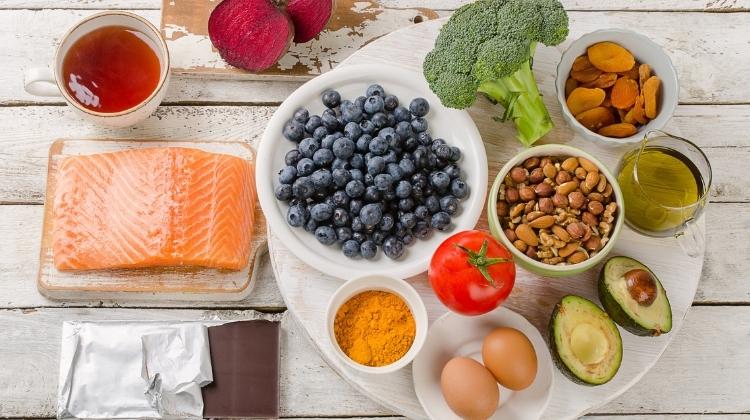 Expert's opinion
Expert's opinion
Expert's opinion
The article is a subjective view on this topic written by writers specializing in medical writing.
It may reflect on a personal journey surrounding struggles with an illness or medical condition, involve product comparisons, diet considerations, or other health-related opinions.
Although the view is entirely that of the writer, it is based on academic experiences and scientific research they have conducted; it is fact-checked by a team of degreed medical experts, and validated by sources attached to the article.
The numbers in parenthesis (1,2,3) will take you to clickable links to related scientific papers.
8 Best Foods That Help To Beat Brain Fog Effectively

Brain fog can appear hanging like a cloud over your head causing a hazy thought process[1]. It is not a medical condition but a symptom. When you get brain fog, making it through basic daily tasks requires extra effort. A little more coffee might be necessary to jump-start your brain and get back your rhythm briefly.
You have probably heard the saying, you are what you eat. If you want to clear the fog in your brain, improve mood, or reduce your mental fatigue, the right foods[2] and healthy habits can help. Getting the right supplements to boost your sluggish brain can be useful too. These foods can help reduce mental fatigue.
8 Best Foods That Help To Beat Brain Fog Effectively
The best foods to beat brain fog provide nutrition for your brain and fight off oxidative stress. They can help with memory and other neurological functions. These brain fog-fighting foods include:
Avocados
Avocados are one of the most versatile foods around. You have got countless ways to include avocados in your diet. They make excellent smoothies and could fit as a topping for a main dish. However, did you know that avocados are excellent for your brain health too?
Avocados contain nutrients such as potassium[3] and magnesium[4] that help with improved blood supply to your brain. Better brain blood supply means better productivity. Lutein, a carotenoid present in avocados, has been shown in studies to improve thinking ability and memory[5]. Avocados can also provide other nutrients[6] such as folate, and vitamins A, D, E, and K. Vitamin E is an essential nutrient that helps fight oxidative damage[7] to your brain and other structures.
You will be getting a healthy dose of monounsaturated fats from avocados that give you the energy to push through the day. Studies show that avocados offer lots of health benefits by providing nutrients and reducing the risk of metabolic syndrome[8].
Salmon
About two servings[9] of salmon a week can help boost your brain health. Salmon is a rich source of omega-3 fatty acids[10] which are essential for maintaining membrane integrity. Hence, salmon may help improve brain function. Omega-3 fatty acid deficiency can negatively affect cognitive function and may predispose you to mental disorders such as depression, dementia, and schizophrenia.
A study[10] on school kids showed improvement in academic performance with omega-3 fatty acid supplements. On the other hand, diets high in saturated and trans fat negatively affect mental performance. If you are looking to make it out of the brain fog, consider giving up junk food and getting healthy polyunsaturated fat from salmon.
Farmed and wild-caught salmon are excellent nutrient sources. However, consider getting wild-caught salmon because they are usually more nutrient-dense[11] than farm-grown salmon.
Turmeric
Curcumin, a component of turmeric, is a potent antioxidant[12]. It has anti-cancer, anti-inflammatory, and antimicrobial properties too. Hence, curcumin has been valuable for arthritis, diabetes, renal, hepatic, and cardiovascular diseases.
The curcumin content of turmeric also makes it useful for improving neurological function. The brain is particularly susceptible to oxidative stress and this is believed to be a contributing factor in several pathological conditions such as Alzheimer’s disease[13]. Curcumin fights inflammation and oxidative damage which could be promising for improving Alzheimer’s disease. Studies[14] also show that curcumin may be valuable for traumatic brain injury treatment.
Curcumin absorption[15] is better with food. So, consider adding some turmeric to your next stir-fry or smoothie to help you unlock the benefits of curcumin for your brain. It may help improve memory and focus.
Olive Oil
The Mediterranean diet[16] is believed to offer many health benefits. This diet is rich in plant foods and can improve brain function and lower cardiovascular and neurodegenerative disease risk. Olive oil is one of the significant features of the Mediterranean diet and could be responsible for some of these benefits.
Olive oil offers significant amounts of monounsaturated fatty acid and polyphenolic compounds[17] offering anti-inflammatory and antioxidant properties. These components of olive oil offer protection to your nervous system from oxidative damage to which it is sensitive. A study[18] observed an improved connection between neurons in animals on an extra-virgin olive oil diet in comparison to their counterparts on a regular diet.
The protective function of olive oil phenols may extend to aging, Alzheimer’s diseases, cerebral ischemia, Huntington’s disease, Parkinson’s disease, peripheral neuropathy, and spinal cord injury. Including moderate amounts of olive oil in your diet may help improve your memory, learning, and brain fog.
Yogurt
You probably know that yogurt is good for your gut. Yogurt contains good bacteria that help keep your gut healthy. However, yogurt is not only good for medical conditions affecting your digestive system but it is great for your brain too. There is a unique link between your digestive system and your brain. So, emotional and mental disorders[19] are related to gastrointestinal symptoms and vice versa.
A study[20] by UCLA researchers compared brain activity in women given yogurt containing Probiotics with women given a dairy product containing no Probiotics. At the end of the study, the researchers noted that the group on probiotic yogurt showed effects in areas of the brain involved in sensory processing and emotion.
Another study[21] on the use of probiotic supplements on patients with Alzheimer’s disease showed significant improvement in their cognitive function. So, if you find your thoughts seem clouded lately, you might want to reach for that jar of yogurt in your fridge.
Beans
Beans are a valuable plant protein source. They are also rich in fiber, so they promote digestive health. They may also help make your brain fog go away. A study[22] found that legumes and plant proteins such as beans can improve cognition in the elderly. The study[23] followed the dietary patterns of elderly Italians to observe these effects.
The omega-3 fatty acids[24] and antioxidants in beans could be responsible for their brain-boosting effects. You may want to add cooked beans to your next meal plan if you are hoping to improve your brain fog symptoms.
Eggs
Choline and xanthophyll carotenoid lutein[25], present in eggs, are known to improve cognitive function. A study[26] found egg yolks to be more beneficial for cognition than egg whites in children.
You can prepare eggs in multiple ways if you would love to include them in your diet. Moderate egg consumption is fine but you do not want to overdo it. Excessive egg consumption can be bad for you because of its significant cholesterol content[27].
Green Leafy Vegetables
Green leafy vegetables such as collard greens, broccoli, kale, and spinach, are a gold mine of nutrients that can help you fight off brain fog symptoms. Some green leafy vegetables such as kale and collard greens are vitamin C and iron-rich. Vitamin C deficiency[28] is linked to cognitive deficit and depression. Green leafy vegetables provide[29] vitamin K, folate, and Lutein, which help promote brain function.
A study[30] found that consuming simply one serving of green leafy vegetables daily can decrease the decline in cognitive abilities. If you would like to fight brain fog and protect your brain health long-term, consider eating more green leafy vegetables.
Another amazing thing about green leafy vegetables is that there are multiple options to choose from to suit each meal. Your green leafy vegetables can appear on your diet in salads, sandwiches, and smoothies.
Conclusion
Sometimes, brain fog could be because you are not getting adequate nutrition. Eating foods that offer antioxidants, reduce inflammation, and contain brain-enriching nutrients can help you make your way out of the brain fog. Supplements that support your brain health can also support your new brain-enriching diet. Brain food such as avocados, salmon, olive oil, turmeric, yogurt, beans, eggs, and dark green leafy vegetables can also help protect your brain’s cognition.
You can also fight other possible causes of brain fog symptoms by ensuring that you get enough sleep, exercise, socialize more, and avoid alcohol and drugs.
+ 30 sources
Health Canal avoids using tertiary references. We have strict sourcing guidelines and rely on peer-reviewed studies, academic researches from medical associations and institutions. To ensure the accuracy of articles in Health Canal, you can read more about the editorial process here
- Ocon, A.J. (2013). Caught in the thickness of brain fog: exploring the cognitive symptoms of Chronic Fatigue Syndrome. Frontiers in Physiology, [online] 4. Available at: https://pubmed.ncbi.nlm.nih.gov/23576989/ [Accessed 26 Nov. 2021].
- Eva Selhub MD (2015). Nutritional psychiatry: Your brain on food – Harvard Health. [online] Harvard Health. Available at: https://www.health.harvard.edu/blog/nutritional-psychiatry-your-brain-on-food-201511168626 [Accessed 26 Nov. 2021].
- American Journal of Physiology-Regulatory, Integrative and Comparative Physiology. (2020). Role of potassium in regulating blood flow and blood pressure | American Journal of Physiology-Regulatory, Integrative and Comparative Physiology. [online] Available at: https://journals.physiology.org/doi/full/10.1152/ajpregu.00491.2005 [Accessed 26 Nov. 2021].
- Murata, T., Dietrich, H.H., Horiuchi, T., Hongo, K. and Dacey, R.G. (2016). Mechanisms of magnesium-induced vasodilation in cerebral penetrating arterioles. Neuroscience Research, [online] 107, pp.57–62. Available at: https://www.ncbi.nlm.nih.gov/pmc/articles/PMC4884497/ [Accessed 26 Nov. 2021].
- Renzi-Hammond, L., Bovier, E., Fletcher, L., Miller, L., Mewborn, C., Lindbergh, C., Baxter, J. and Hammond, B. (2017). Effects of a Lutein and Zeaxanthin Intervention on Cognitive Function: A Randomized, Double-Masked, Placebo-Controlled Trial of Younger Healthy Adults. Nutrients, [online] 9(11), p.1246. Available at: https://www.ncbi.nlm.nih.gov/pmc/articles/PMC5707718/ [Accessed 26 Nov. 2021].
- Usda.gov. (2021). FoodData Central. [online] Available at: https://fdc.nal.usda.gov/fdc-app.html#/food-details/171705/nutrients [Accessed 26 Nov. 2021].
- Tan, B.L., Norhaizan, M.E., Liew, W.-P.-P. and Sulaiman Rahman, H. (2018). Antioxidant and Oxidative Stress: A Mutual Interplay in Age-Related Diseases. Frontiers in Pharmacology, [online] 9. Available at: https://www.ncbi.nlm.nih.gov/pmc/articles/PMC6204759/ [Accessed 26 Nov. 2021].
- Tabeshpour, J., Razavi, B.M. and Hosseinzadeh, H. (2017). Effects of Avocado (Persea americana)on Metabolic Syndrome: A Comprehensive Systematic Review. Phytotherapy Research, [online] 31(6), pp.819–837. Available at: https://pubmed.ncbi.nlm.nih.gov/28393409/ [Accessed 26 Nov. 2021].
- Usda.gov. (2013). Eat fish! Which Fish? That Fish! Go Fish! : USDA ARS. [online] Available at: https://www.ars.usda.gov/plains-area/gfnd/gfhnrc/docs/news-2013/eat-fish-which-fish-that-fish-go-fish/ [Accessed 26 Nov. 2021].
- Gómez-Pinilla, F. (2008). Brain foods: the effects of nutrients on brain function. Nature Reviews Neuroscience, [online] 9(7), pp.568–578. Available at: https://www.ncbi.nlm.nih.gov/pmc/articles/PMC2805706/ [Accessed 26 Nov. 2021].
- Google.com. (2021). Redirecting. [online] Available at: https://www.google.com/url?q=https://www.mdpi.com/2304-8158/9/12/1901/pdf&sa=D&source=docs&ust=1637903017475000&usg=AOvVaw3ukWa8tyGgWNR7Aand5d9Y [Accessed 26 Nov. 2021].
- Bhat, A., Mahalakshmi, A.M., Ray, B., Tuladhar, S., Hediyal, T.A., Manthiannem, E., Padamati, J., Chandra, R., Chidambaram, S.B. and Sakharkar, M.K. (2019). Benefits of curcumin in brain disorders. BioFactors, [online] 45(5), pp.666–689. Available at: https://pubmed.ncbi.nlm.nih.gov/31185140/ [Accessed 26 Nov. 2021].
- Mishra, S. and Palanivelu, K. (2008). The effect of curcumin (turmeric) onAlzheimer′s disease: An overview. Annals of Indian Academy of Neurology, [online] 11(1), p.13. Available at: https://www.ncbi.nlm.nih.gov/pmc/articles/PMC2781139/ [Accessed 26 Nov. 2021].
- Farkhondeh, T., Samarghandian, S., Roshanravan, B. and Peivasteh-roudsari, L. (2020). Impact of Curcumin on Traumatic Brain Injury and Involved Molecular Signaling Pathways. Recent Patents on Food, Nutrition & Agriculture, [online] 11(2), pp.137–144. Available at: https://pubmed.ncbi.nlm.nih.gov/31288732/ [Accessed 26 Nov. 2021].
- Mishra, S. and Palanivelu, K. (2008). The effect of curcumin (turmeric) onAlzheimer′s disease: An overview. Annals of Indian Academy of Neurology, [online] 11(1), p.13. Available at: https://www.ncbi.nlm.nih.gov/pmc/articles/PMC2781139/ [Accessed 26 Nov. 2021].
- Amel, N., Wafa, T., Samia, D., Yousra, B., Issam, C., Cheraif, I., Attia, N. and Mohamed, H. (2016). Extra virgin olive oil modulates brain docosahexaenoic acid level and oxidative damage caused by 2,4-Dichlorophenoxyacetic acid in rats. Journal of Food Science and Technology, [online] 53(3), pp.1454–1464. Available at: https://www.ncbi.nlm.nih.gov/pmc/articles/PMC4984713/ [Accessed 26 Nov. 2021].
- Farr, S.A., Price, T.O., Dominguez, L.J., Motisi, A., Saiano, F., Niehoff, M.L., Morley, J.E., Banks, W.A., Ercal, N. and Barbagallo, M. (2012). Extra Virgin Olive Oil Improves Learning and Memory in SAMP8 Mice. Journal of Alzheimer’s Disease, [online] 28(1), pp.81–92. Available at: https://pubmed.ncbi.nlm.nih.gov/21955812/ [Accessed 26 Nov. 2021].
- ScienceDaily. (2017). Extra-virgin olive oil preserves memory, protects brain against Alzheimer’s. [online] Available at: https://www.sciencedaily.com/releases/2017/06/170621103123.htm [Accessed 26 Nov. 2021].
- Shah, E., Rezaie, A., Riddle, M. and Pimentel, M. (2014). Psychological disorders in gastrointestinal disease: epiphenomenon, cause or consequence? Annals of gastroenterology, [online] 27(3), pp.224–230. Available at: https://www.ncbi.nlm.nih.gov/pmc/articles/PMC4073018/ [Accessed 26 Nov. 2021].
- Champeau, R. (2013). Changing gut bacteria through diet affects brain function, UCLA study shows. [online] UCLA. Available at: https://newsroom.ucla.edu/releases/changing-gut-bacteria-through-245617 [Accessed 26 Nov. 2021].
- Akbari, E., Asemi, Z., Daneshvar Kakhaki, R., Bahmani, F., Kouchaki, E., Tamtaji, O.R., Hamidi, G.A. and Salami, M. (2016). Effect of Probiotic Supplementation on Cognitive Function and Metabolic Status in Alzheimer’s Disease: A Randomized, Double-Blind and Controlled Trial. Frontiers in Aging Neuroscience, [online] 8. Available at: https://www.frontiersin.org/articles/10.3389/fnagi.2016.00256/full [Accessed 26 Nov. 2021].
- Mazza, E., Fava, A., Ferro, Y., Moraca, M., Rotundo, S., Colica, C., Provenzano, F., Terracciano, R., Greco, M., Foti, D., Gulletta, E., Russo, D., Bosco, D., Pujia, A. and Montalcini, T. (2017). Impact of legumes and plant proteins consumption on cognitive performances in the elderly. Journal of Translational Medicine, [online] 15(1). Available at: https://www.ncbi.nlm.nih.gov/pmc/articles/PMC5440936/ [Accessed 26 Nov. 2021].
- Mazza, E., Fava, A., Ferro, Y., Moraca, M., Rotundo, S., Colica, C., Provenzano, F., Terracciano, R., Greco, M., Foti, D., Gulletta, E., Russo, D., Bosco, D., Pujia, A. and Montalcini, T. (2017). Impact of legumes and plant proteins consumption on cognitive performances in the elderly. Journal of Translational Medicine, [online] 15(1). Available at: https://www.ncbi.nlm.nih.gov/pmc/articles/PMC5440936/ [Accessed 26 Nov. 2021].
- Physicians Committee for Responsible Medicine. (2021). Omega-3 Fatty Acids and Plant-Based Diets. [online] Available at: https://www.pcrm.org/good-nutrition/nutrition-information/omega-3 [Accessed 26 Nov. 2021].
- Wallace, T.C. (2018). A Comprehensive Review of Eggs, Choline, and Lutein on Cognition Across the Life-span. [online] ResearchGate. Available at: https://www.researchgate.net/publication/323231717_A_Comprehensive_Review_of_Eggs_Choline_and_Lutein_on_Cognition_Across_the_Life-span [Accessed 26 Nov. 2021].
- Kucab, M., Boateng, T., Brett, N., Schwartz, A., Zepetnek, J.T. de and Bellissimo, N. (2019). Effects of Eggs and Egg Components on Cognitive Performance, Glycemic Response, and Subjective Appetite in Children Aged 9–14 Years (P14-017-19). Current Developments in Nutrition, [online] 3(Supplement_1). Available at: https://www.ncbi.nlm.nih.gov/pmc/articles/PMC6574919/ [Accessed 26 Nov. 2021].
- Zhuang, P., Wu, F., Mao, L., Zhu, F., Zhang, Y., Chen, X., Jiao, J. and Zhang, Y. (2021). Egg and cholesterol consumption and mortality from cardiovascular and different causes in the United States: A population-based cohort study. PLOS Medicine, [online] 18(2), p.e1003508. Available at: https://journals.plos.org/plosmedicine/article?id=10.1371/journal.pmed.1003508 [Accessed 26 Nov. 2021].
- Plevin, D. and Galletly, C. (2020). The neuropsychiatric effects of vitamin C deficiency: a systematic review. BMC Psychiatry, [online] 20(1). Available at: https://bmcpsychiatry.biomedcentral.com/articles/10.1186/s12888-020-02730-w [Accessed 26 Nov. 2021].
- Harvard Health. (2017). Foods linked to better brainpower – Harvard Health. [online] Available at: https://www.health.harvard.edu/healthbeat/foods-linked-to-better-brainpower [Accessed 26 Nov. 2021].
- Morris, M.C., Wang, Y., Barnes, L.L., Bennett, D.A., Dawson-Hughes, B. and Booth, S.L. (2017). Nutrients and bioactives in green leafy vegetables and cognitive decline. Neurology, [online] 90(3), pp.e214–e222. Available at: https://pubmed.ncbi.nlm.nih.gov/29263222/ [Accessed 26 Nov. 2021].



